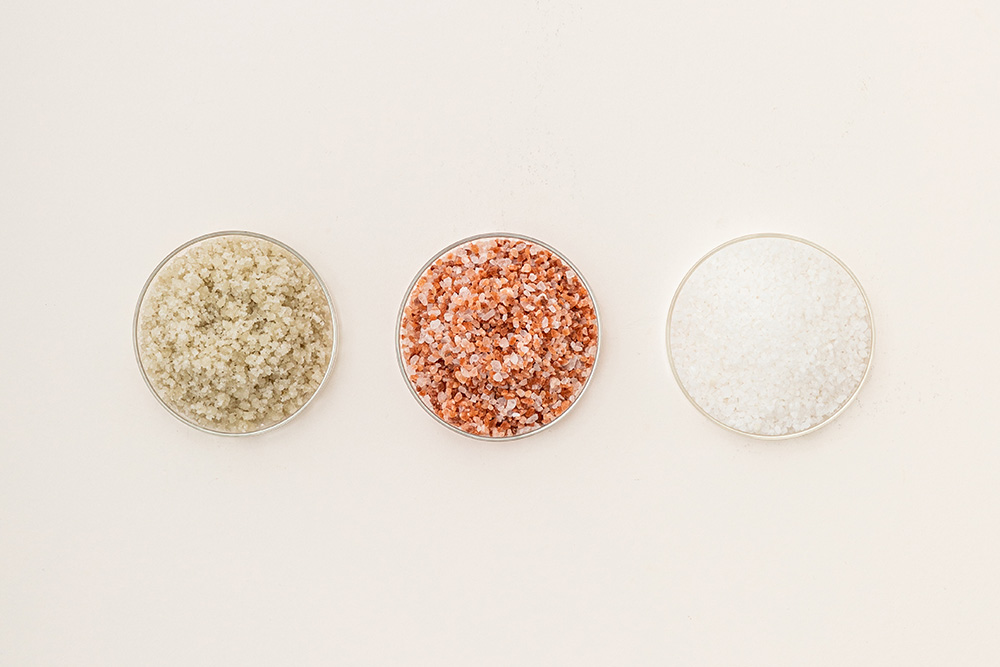
17 Oct Exploring the World of Salt: Celtic, Himalayan, and Oryx Desert Salt
Salt is an essential element for human survival and has been a vital part of our diet for centuries. While table salt is the most common form of salt, many other varieties offer unique flavours, mineral contents, and health benefits. In this article, we will compare three distinct types of salt: Celtic salt, Himalayan salt, and Oryx Desert salt. We will explore their origins, mineral compositions, and the potential health benefits they offer.
Celtic Salt
Celtic salt, also known as sel gris or grey salt, hails from the coastal regions of Brittany, France. It is harvested through the evaporation of seawater in shallow clay ponds, resulting in its characteristic grey colour.
Celtic salt is renowned for its rich mineral content, including essential elements like magnesium, calcium, potassium, and trace minerals. These minerals contribute to its unique flavour profile and health benefits.
Health Benefits:
- Magnesium, present in Celtic salt, plays a vital role in muscle and nerve function, bone health, and energy metabolism.
- Calcium is essential for strong bones and teeth, while potassium helps regulate blood pressure and fluid balance in the body.
- The trace minerals in Celtic salt are believed to support various bodily functions, such as immune system health and electrolyte balance.
Himalayan Salt
Himalayan salt, often called pink salt or rock salt, is sourced from the Salt Range mountains in Pakistan. It is believed to be millions of years old and is harvested from deep underground mines.
The distinctive pink colour of Himalayan salt comes from trace minerals like iron, potassium, and magnesium. It also contains calcium, copper, and zinc, making it one of the most mineral-rich salts available.
Health Benefits:
- Iron gives Himalayan salt its pink hue and can contribute to oxygen transport in the body.
- The minerals in Himalayan salt are believed to support pH balance and hydration due to their electrolyte properties.
- Himalayan salt can help improve respiratory health and reduce allergy symptoms when used in salt lamps or inhalers.
Oryx Desert Salt
Oryx Desert salt, as the name suggests, is sourced from the pristine Kalahari Desert in South Africa. It is harvested from underground salt deposits left by ancient oceans that dried up millions of years ago.
This salt is celebrated for its purity and high mineral content. It contains essential minerals like sodium, potassium, magnesium, and calcium, as well as trace elements such as zinc and copper.
Health Benefits:
- Oryx Desert salt is unrefined and free from additives, making it a healthier alternative to processed table salt.
- Its balanced mineral composition supports electrolyte balance and overall wellbeing.
- The salt’s natural purity and flavour make it an excellent choice for enhancing the taste of dishes without the need for excessive sodium.
Choosing the Right Salt for You
Each of these salts has its own unique characteristics and potential health benefits, making it important to choose the one that best aligns with your preferences and dietary needs.
Celtic salt is an excellent choice for those looking to add a variety of essential minerals to their diet while enjoying a slightly briny flavour.
Himalayan salt is a versatile option with a pink hue and a slightly milder taste. It’s perfect for those who want to experiment with different flavours while benefiting from its mineral-rich content.
Oryx Desert salt, with its natural purity and well-balanced mineral composition, is a great option for those seeking a straightforward, unprocessed salt that complements a wide range of culinary creations.
In the world of salt, there is more to explore than just the traditional table salt. Celtic salt, Himalayan salt, and Oryx Desert salt offer distinct flavours, mineral compositions, and potential health benefits. Incorporating these flavourful and mineral-rich salts into your diet can be a delicious way to support your overall wellbeing while enhancing your culinary creations.



No Comments